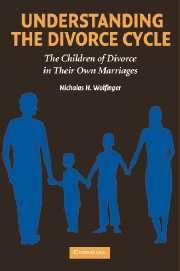Book contents
- Frontmatter
- Contents
- Preface
- Acknowledgments
- 1 Introduction
- 2 Why Divorce Begets Divorce
- 3 Coupling and Uncoupling
- 4 How Strong Is the Divorce Cycle?
- 5 Historical Developments
- 6 The Cohabitation Revolution
- 7 Conclusion
- Appendix A Data and Methods
- Appendix B Evaluating the Role of Marriage Differentials in the Weakening Divorce Cycle
- Notes
- Bibliography
- Index
Appendix A - Data and Methods
Published online by Cambridge University Press: 27 July 2009
- Frontmatter
- Contents
- Preface
- Acknowledgments
- 1 Introduction
- 2 Why Divorce Begets Divorce
- 3 Coupling and Uncoupling
- 4 How Strong Is the Divorce Cycle?
- 5 Historical Developments
- 6 The Cohabitation Revolution
- 7 Conclusion
- Appendix A Data and Methods
- Appendix B Evaluating the Role of Marriage Differentials in the Weakening Divorce Cycle
- Notes
- Bibliography
- Index
Summary
Data
Chapter 6 analyzes data from the National Survey of Families and Households (NSFH), while Chapter 5 uses the General Social Survey (GSS). Chapters 3 and 4 employ both data sets. The NSFH contains unusually detailed measures of marital behavior and cohabitation, while the GSS provides trend data with a large aggregated sample size. No other data sets offer these features.
The NSFH is a national sample survey of adults nineteen and over in the United States. The respondents interviewed in 1987 and 1988 numbered 13,007. This included a main sample of 9,643 respondents plus an oversample of minorities, newlyweds, single parents, individual parents in stepparent families, and individuals in cohabiting unions. From 1992 to 1994, 10,008 respondents were re-interviewed. This raises the question of whether to use both waves in order to maximize information on respondent relationship histories. However, analyzing only Wave One provides a larger overall sample size, as well as eliminating the possibility of attrition bias. I use both waves of data in the two analyses for which extensive information on relationship histories is especially desirable: the investigations of entire respondent marital histories (Chapter 4); and cohabitation stability (Chapter 6). Preliminary analyses suggested that respondent attrition is unlikely to have affected the results. Elsewhere I use only the Wave one data.
In addition to the primary interviews, current spouses of NSFH respondents were also queried. Information on former spouses and nonresponding current spouses was obtained from the primary respondents.
Information
- Type
- Chapter
- Information
- Understanding the Divorce CycleThe Children of Divorce in their Own Marriages, pp. 127 - 141Publisher: Cambridge University PressPrint publication year: 2005
